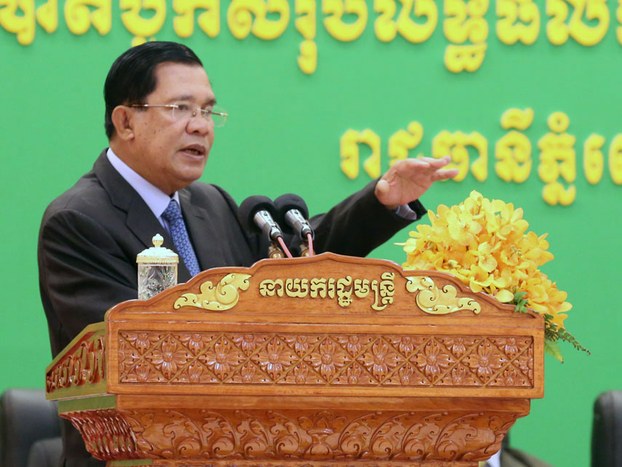




Cambodia’s Prime Minister Hun Sen has ordered the immediate arrest of any politician who claims he can eliminate public debt if elected, saying the people’s loans belong to the state.
The statement prompted criticism from watchdogs who said such promises do not imply loans would be forgiven and could refer to better governance in the financial industry as part of a bid to ensure farmers stay out of debt.
Speaking at an annual microfinance conference in the capital Phnom Penh on Monday, Hun Sen accused unnamed politicians of “cheating” the people of Cambodia by making “illegal” claims that went against the country’s financial regulations.
“To the various political parties: please do not commit cheap acts and cheat the people by saying that if you win, you will eliminate debt,” the prime minister said.
“[For those who commit] such acts, just block them and arrest them immediately … That is abusing financial regulations and you will be arrested on the spot—even lawmakers—because these are actual crimes,” he said.
Hun Sen said politicians promising to erase public debts would be committing an “in flagrante delicto offense”—meaning to be caught in the act of a crime—with the aim of “political gain by swindling Cambodian citizens.”
He did not specify which politicians had allegedly made the claims or what law they had broken.
A report by the Voice of Democracy on Monday said Prince Norodom Ranariddh, president of the royalist Funcinpec party, pledged to eliminate debt during a speech in June.
Hun Sen similarly criticized political pledges to eradicate debt in the lead up to Cambodia’s 2013 national election, when he accused the opposition Cambodia National Rescue Party (CNRP) of promising to do so.
He said at the time that CNRP politicians would have to destroy the nation’s banking system—like the Khmer Rouge did when it led the country from 1975-79—in order to erase people’s loans. The CNRP denied having made such a pledge.
Different interpretation
Meas Ny, an independent observer, told RFA’s Khmer Service that Hun Sen’s latest condemnation was “of little benefit to the government’s reputation,” because pledges to eliminate debt don’t necessarily imply parties would break the law.
“If [political parties] say that they will try to kill the prime minister … it is illegal and it is against the constitution,” he said. “But if they are talking about a policy of debt elimination, it doesn’t simply mean they will forget people’s loans, it could mean they will find ways to keep people out of debt in the future.”
Meas Ny acknowledged that pledges to eliminate debt if elected are “politically risky” because of how difficult they are to fulfill, but said parties are entitled to make whatever policy statements they like, provided they do not advocate illegal acts.
The Phnom Penh Post quoted Am Sam Ath, technical supervisor for local rights groups Licadho, as saying that pledging to eliminate debt, however unfeasible, was a politician’s right.
“I think it’s just the opinion of a politician being a demagogue, so there’s no offense and saying such things does not cause chaos,” he told the newspaper.
“Looking at the law, it’s not incitement," he said.
Sam Eun, general secretary and spokesman of the Rural Democratic Party, told RFA Hun Sen should take measures to ensure farmers are not taken advantage of with bad loans, rather than threatening politicians with arrest.
He cautioned that good governance of the financial industry is essential to the economic development of Cambodia.
Reported by Sonorng Khe for RFA’s Khmer Service. Translated by Pagnawath Khun. Written in English by Joshua Lipes.